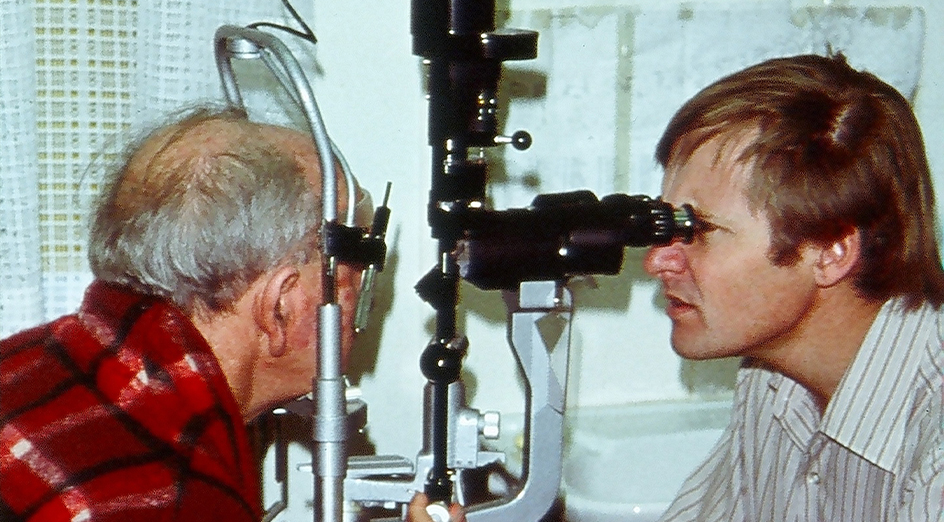UWA's eye care pioneer celebrates half a century of sight-saving science
"It seems like just yesterday," reflects Professor Ian Constable AO, reminiscing about his arrival at The University of Western Australia as the Foundation Lions Professor of Ophthalmology in April 1975.
As possibly UWA's longest-serving full professor, the internationally renowned specialist's 50-year journey has transformed eye health research and care, not just in Western Australia, but globally.
After graduating in medicine from the University of Sydney and working as a Resident Medical Officer at Royal Prince Alfred Hospital, the young ophthalmologist's path led him to Harvard in Boston, US.
He spent five years engaged in retinal research as a Fellow at the Massachusetts Eye and Ear Infirmary and later as a consultant surgeon and lecturer at Harvard University.
 Image: Professor Ian Constable examining a patient at Royal Perth Hospital, 1975.
Image: Professor Ian Constable examining a patient at Royal Perth Hospital, 1975.
In 1975, he brought this wealth of experience to Perth, taking up the inaugural Lions Chair of Ophthalmology at UWA.
"I had five years of lab work at Harvard, so I was used to setting things up and I was used to talking to scientists," Professor Constable explains.
This experience proved invaluable as he began building his team, recruiting promising UWA postgraduates in cell biology, physiology and polymer chemistry.
His approach was revolutionary for its time.
"From the very beginning we used our ability to see and treat patients to generate funding – we would take an eye problem and apply science to it rather than just clinical work, which was great training and career opportunity for our young scientists," he explains.
This philosophy led to remarkable breakthroughs, including the world's first virus-transmitted DNA treatment in adult humans with macular degeneration – research that began in Perth and eventually led to a US$400 million listing on the New York Stock Exchange.
The journey wasn't without its challenges. As his research team expanded beyond Royal Perth Hospital's capacity, then-Premier Sir Charles Court offered space at the old Sir Charles Gairdner Hospital.
This move in 1985 marked the beginning of what would become the Lions Eye Institute, now a world-renowned centre for eye research and clinical care.
Throughout his career, Professor Constable maintained a deep connection with UWA.
"The relationship with the University has always been fantastic because it allowed me to try everything possible through the years," he says.
"I was helped extensively by Professor Bob Whelan in the 1970s, Robert Street in the 1980s, and then by the then-VC Alan Robson in setting up UWA's Centre for Ophthalmology and Visual Science in the 1990s.
"We've been able to appoint people from outside onto the University staff and use the facilities and infrastructure, it's been a terrific relationship.
"Both my sons attended UWA and my wife Elizabeth, who was a Member of Parliament and the Minister for Education, was a Vice-Chancellor's Fellow for five years after she retired from politics and so our links with the University are comprehensive."
Professor Constable's commitment to Indigenous eye health has been particularly significant, culminating in the establishment of the comprehensive Lions Outback Vision service in Broome by UWA's Professor Angus Turner.
"It's a first-world service centre in a disadvantaged environment," he says, describing how the program now serves communities across the Kimberley and Pilbara regions with a resident team including a dedicated pilot who flies specialists to remote areas.
Even after 50 years, his passion for innovation remains undimmed. He continues to collaborate on cutting-edge RNA therapy in Perth and collaborates internationally on glaucoma research through the Snow Family Medical Foundation and retinal disease through the Lowy Family Medical Research Institute.
Still seeing patients two days a week, he finds particular joy in working with young graduates and undergraduates.
"It's good to be around young people – to see them grow is the best part of it all," he says of the many scientists and clinicians he has mentored over the decades.
As he reflects on his legacy, his hopes remain focused on service. "I just hope that in WA we continue to have a first-class, international service and good research and good teaching," he reflects.
From 1975 to today, Professor Constable's dedication to excellence has transformed how we understand and treat eye disease, trained generations of specialists and created a legacy that will continue to impact lives for generations to come.
- At the Lion Eye Institute's 25th annual Ian Constable Lecture Professor Ian Meredith AM will explore the topic of how global health challenges, such as a growing and ageing population, provide both challenges and opportunities for MedTech (medical technology) innovation. The lecture will be held on Wednesday 26 February from 7pm – 8.30pm at The University Club of Western Australia. Tickets are free and can be booked here.






